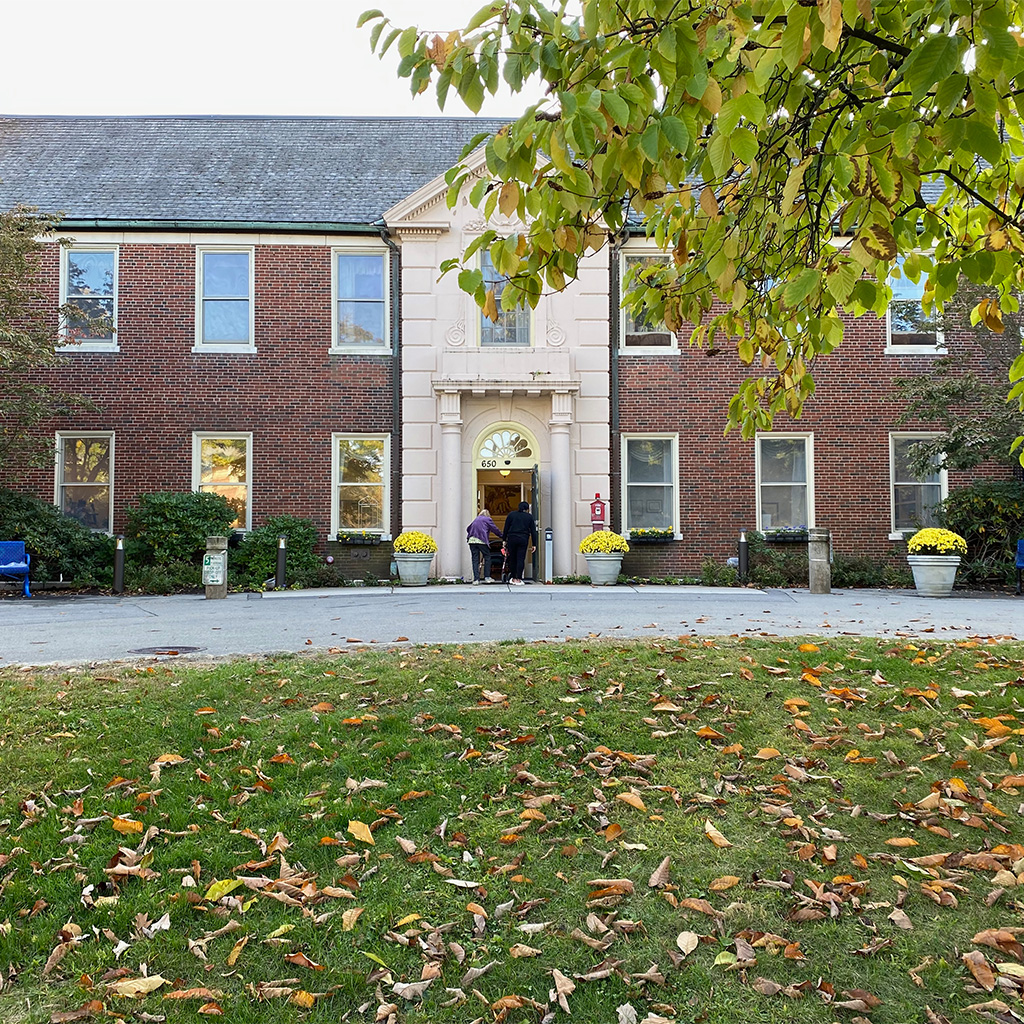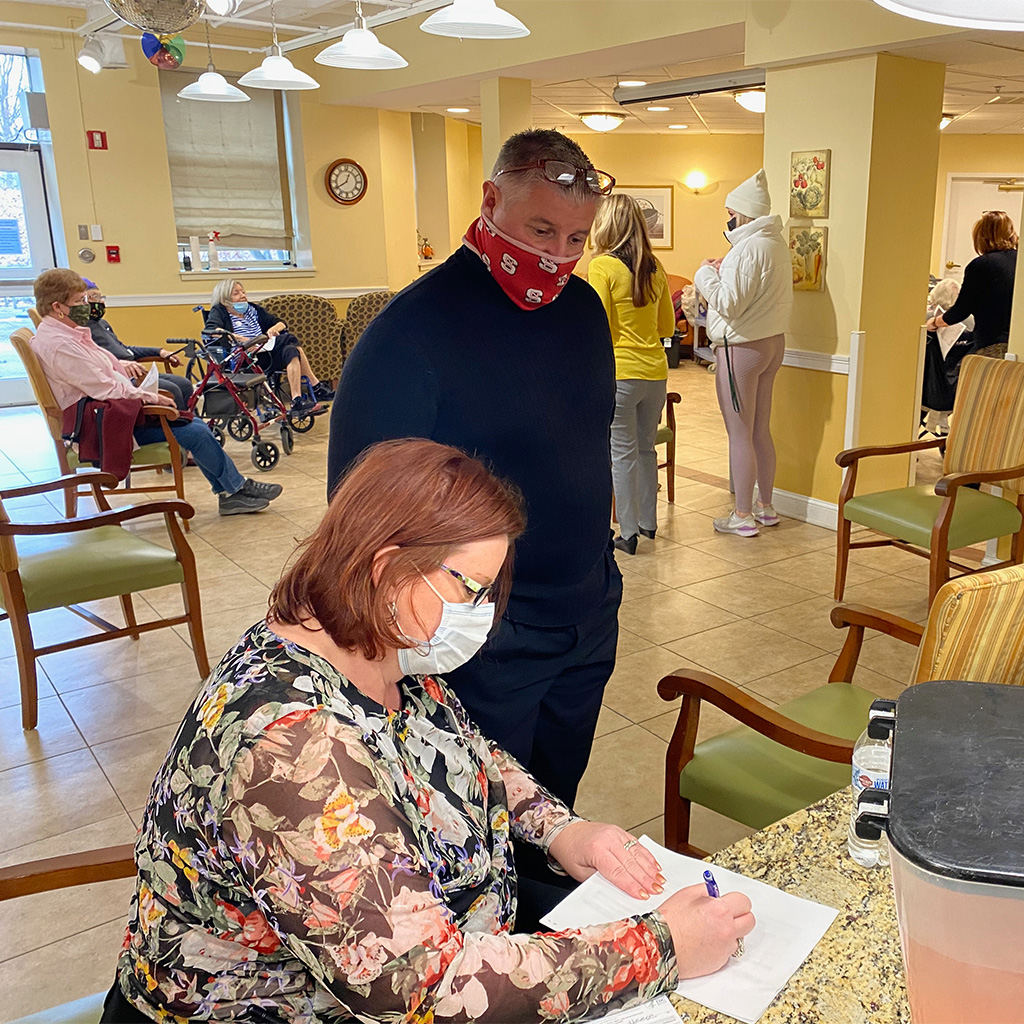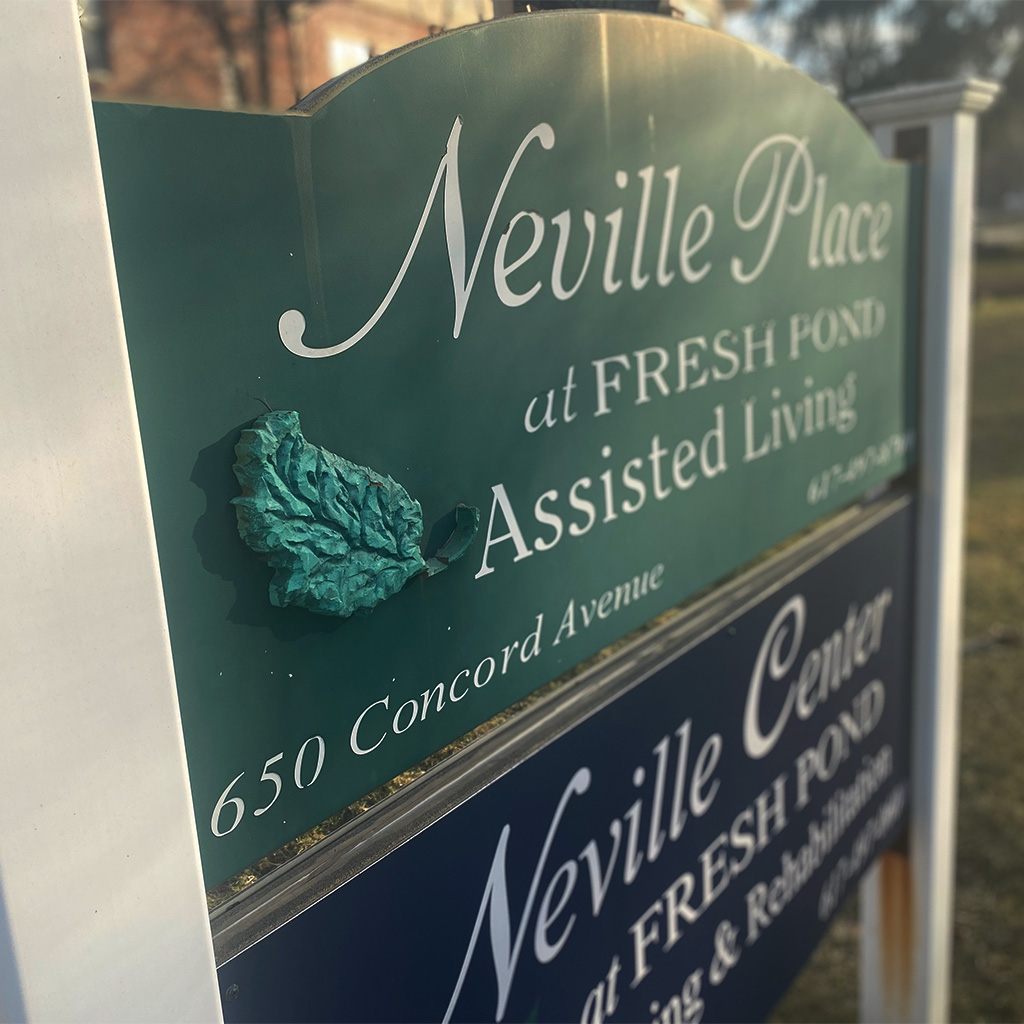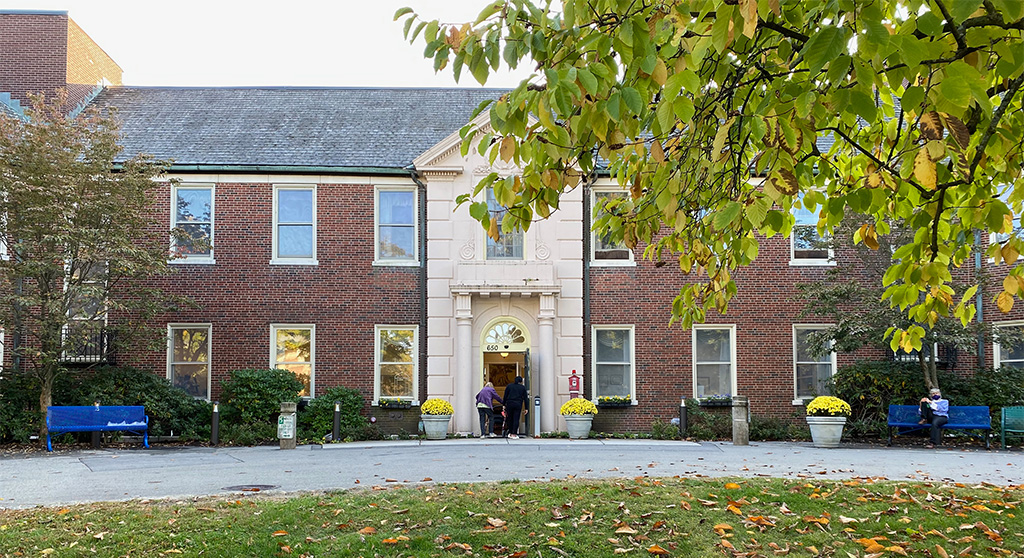Cambridge’s affordable assisted-living option, Neville Place, let slip money needed for repairs

The entrance to Neville Place at Fresh Pond, an assisted-living center in Cambridge. (Photo: Marc Levy)
Amid a senior care market in which a one-bedroom apartment in assisted living can cost $7,500 a month, Cambridge offers a rare affordable option: an assisted-living facility in which 57 of the 71 units must go to low- and moderate-income individuals and families. But that choice – Neville Place Assisted Living at Fresh Pond – is facing financial challenges.
Neville Place, established in 2000 on the site of a former city nursing home with financial help from the city, the Cambridge Housing Authority, Cambridge Health Alliance and state, needs a new roof, heating and air conditioning system, and other repairs, but lacks the money to pay for them. It had to tap its replacement and operating reserves after occupancy dropped before and during the pandemic, and it failed to take full advantage of financial help it had received from the housing authority, according to an analysis by the city’s Affordable Housing Trust.
In May the trust approved a $2.5 million loan to Neville Communities Inc., the nonprofit that owns Neville Place and the related nursing home on the same property, Neville Center. The loan, which can help only the assisted-living residence, comes with many strings attached, and was intended to keep Neville Place financially healthy for the next 20 years.
The Affordable Housing Trust analysis questioned Neville’s failure to make full use of 30 rental assistance vouchers it got from the housing authority that would have increased income if more of the vouchers had been distributed to low-income residents and if Neville had updated maximum rents allowed under the subsidies. The Trust also said that Neville’s complex application process discouraged potential residents from applying and prevented other city agencies that help low-income older residents from working with the assisted-living residence to bring in more applicants.
Overall good grades

Staff at Neville Place confer over Covid vaccinations Jan. 14. 2021. (Photo: Marc Levy)
Still, the Trust gave Neville Place overall good grades. “Neville Place’s ability to provide welcoming and comfortable assisted living at significantly less than market rates is an important community benefit,” Affordable Housing Trust staff concluded. “While a number of questions remain, it is clear that the property has been successfully serving low- and moderate-income households in need of assisted living and that efforts should be made to enable this important resource to remain available over the long-term.”
Andrew Fuqua, president of Neville Communities – and chief counsel for the Cambridge Health Alliance – said: “We continually work toward optimal financial stability by balancing quality services and cost management.” The board of Neville Communities includes officials from the Alliance, the housing authority and the city.
Fuqua said Neville’s occupancy rate had “quickly rebounded” after falling in 2019 because of unspecified “factors in the local market.” He did not mention the pandemic, when occupancy dropped in assisted living facilities nationwide because of fears about Covid-19.
Vouchers and rent levels
As of now, 98 percent to 100 percent of Neville’s units are filled, “demonstrating sustained stability,” Fuqua said. But Neville still isn’t using all of its 30 rental assistance vouchers. “Historically, we’ve used about 18 on average,” Fuqua said. “We are working closely with the Cambridge Housing Authority to increase voucher utilization.”
The vouchers, which are attached to the property, would provide more income to Neville because the federal government would pay the difference between 30 percent of a low-income resident’s income – the most a resident must pay – and the maximum Section 8 rent. Otherwise, Neville can collect only the resident’s share.
Neville also failed to update the maximum rent when the government raised it. The Affordable Housing Trust said in May that the assisted-living facility has now increased the maximum but still is using only 18 of the 30 vouchers. Neville is fully occupied, the trust said, but even with these improvements “there is insufficient operating income to support anticipated capital repairs over time.”
Conditions on loan
The trust attached a list of conditions to its approval of the loan, including: establishing a “working group” with the trust to develop an “affirmative marketing and tenant selection plan” that would present a clear description of the resident selection process; working with the Alliance, housing authority and other community groups to get tenant referrals; creating plans to use all 30 vouchers and fund capital reserves; and getting staff approval for long-term capital needs and operating budget plans and immediate construction.
The Trust split up the loan, agreeing to lend Neville $1.6 million now for immediate capital needs such as the roof and HVAC system. To get the rest of the funds, Neville must meet most of the conditions.
The loan is structured and timed to help Neville refinance an $8.4 million mortgage with Rockland Trust by getting a loan from Cambridge Savings Bank at a lower interest rate. The Rockland Trust mortgage matured in July with Neville owing about $6.2 million, the trust said. As of Friday there is no entry in legal property records indicating that the mortgage has been refinanced or that the Affordable Housing Trust has loaned money to Neville. Fuqua didn’t answer when asked the status of the trust loan. He did express thanks to the trust, saying its “support has empowered us to enhance our facilities and services while maintaining positive operational margins.”
How Neville became affordable

A nonprofit owns Neville Place and the related nursing home on the same property, Neville Center. (Photo: Marc Levy)
It’s extremely difficult to introduce affordability into assisted living. An estimated 90 percent of residents in Massachusetts facilities pay privately, according to Mass-ALA, the state’s industry group. The cost varies widely because residents, who are considered tenants, not only pay rent for a housing unit but for services such as meals, personal care, housekeeping and, in some facilities, memory care. Assisted living does not cover medical care.
Neville has deep affordability because the local and state agencies that funded the project required that 57 of the 71 apartments be rented to individuals and families with income below 80 percent of the area median; some of the 57 affordable units must go to tenants with much lower income, as low as 40 percent of median.
The Section 8 vouchers given to Neville can cover only residents’ cost for rent. The trust said Neville was “dedicated” to helping low-income residents pay for services. Still, the assisted-living facility’s “financial model has assumed the majority of applicants would be able to supplement their income with savings, assets or family contributions,” the trust said. “NCI staff have reported that they work with applicants and current residents to find subsidies to support the charges when savings and assets are not available.”
Affordability in other facilities
One of Cambridge’s other assisted-living residences, The Cambridge Homes, has an endowment that can provide “scholarships” to residents who need financial help to pay for rent and services, according to its website. A second facility in Cambridge, Cadbury Commons, has no information on its website about financial aid. An email to the organization wasn’t immediately answered.
The remaining assisted-living residence in Cambridge, Youville House, provides six units to low-income tenants through the Program of All-inclusive Care for the Elderly, or Pace, a federal-state program for people who are eligible for Medicare and Medicaid, said Joanne Scianna, interim chief executive of Youville Assisted Living, which operates Youville House in Cambridge and Youville Place in Lexington. Those units are occupied, she said. Youville also privately finances six more affordable units at Youville House; two of those apartments are available, Scianna said. The Cambridge facility has 95 apartments.
“We constantly accept applications and put people on a waiting list,” Scianna said.
Aid only for assisted living
Neville originally asked the Affordable Housing Trust for financial help for its nursing home, Neville Center, as well as for Neville Place. The city agency said it couldn’t provide funds to a nursing home because that is a medical facility, not housing.
Fuqua said the money sought for the nursing home “would have aided basic facility repairs and upgrades, reinforcing our dedication to providing the best for our residents.” He said that “Neville Center’s 5-star rating and strong occupancy rate showcase our commitment to superior care.” It’s not known how Neville will pay for any necessary nursing home improvements and repairs.



